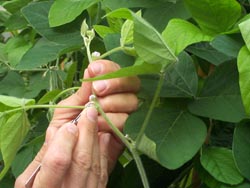Milan, Tennessee
June 29, 2004
The Mid-South has more
acreage planted with soybeans than any other row crop.
Given the high prices soybeans demanded in 2003, it
should come as no surprise that the Milan No-Till Field
Day has two tours devoted to soybean production.
Scheduled for July 22 at the
University of
Tennessee (UT) Agricultural Experiment Station in
Milan, the field day is among the best known and most
attended no-till events in the nation.
At the field day soybean producers will have the
opportunity to meet the UT researchers who developed two
of the new check varieties featured in the USDA Southern
Uniform Testing Program. The program allows breeders to
determine the region’s best-performing varieties.
The two new check
varieties, 5601T and 5002T, are so productive and
well-adapted to the Mid-South, Southeast, and
Mid-Atlantic that they replaced ‘Hutcheson’ and ‘Manokin’,
respectively. Both Hutcheson and Manokin have been
household words in the soybean industry, and both served
as the USDA checks for the past decade. |
 |
|
Researchers with the University of Tennessee and USDA
are using classic breeding (shown in photo) and modern
biotechnology methods to transfer SCN resistance genes
into new high-yielding soybean varieties. |
The variety 5601T is a
conventional maturity 5.6 soybean. It is marketed as USG 5601T
by UniSouth Genetics. Yields of 5601T typically exceed those of
Hutcheson by about 5 bu/acre. The variety is resistant to stem
canker and soybean mosaic virus and shows moderate resistance to
root knot nematodes.
However, 5601T is not resistant to an increasingly worrisome
pest, the soybean cyst nematode (SCN).
The cultivar 5002T is a conventional maturity 5.0 variety. It
typically produces about 4 bu/acre higher yields than the
previous check variety Manokin and is resistant to stem canker.
5002T is rated as tolerant to sudden death syndrome and
susceptible to SCN.
“High yields are critical to soybean producer profit margins,”
says Vince Pantalone, lead researcher with the UT Soybean
Breeding and Genetics Program. Pantalone and Prakash Arelli, a
research geneticist for USDA-ARS at Jackson, Tenn., are
collaborating to develop a soybean resistant to SCN, which
causes significant yield losses. Arelli says more aggressive
nematode populations have been identified in the region.
The scientists are combining genes from traditional sources of
SCN resistance with genes from unique and new sources. “We are
using both classical breeding and modern biotechnology methods
to transfer SCN resistance genes into high-yielding soybeans
being developed for the Mid-South,” Pantalone said.
Although the results of this new cooperative project have yet to
come to fruition, producers can examine soybean variety tests at
the Milan No-Till Field Day, and Pantalone says certified seeds
of both 5601T and 5002T will be available from UniSouth Genetics
for planting in 2005.
More information about the soybean tours at the Milan No-Till
Field Day is available online at http://milan.tennessee.edu. The
event is expected to attract thousands interested in no-till
production and agribusiness. Tours will also explore cotton and
corn production, livestock and forages, forestry and wildlife
issues and marketing. |